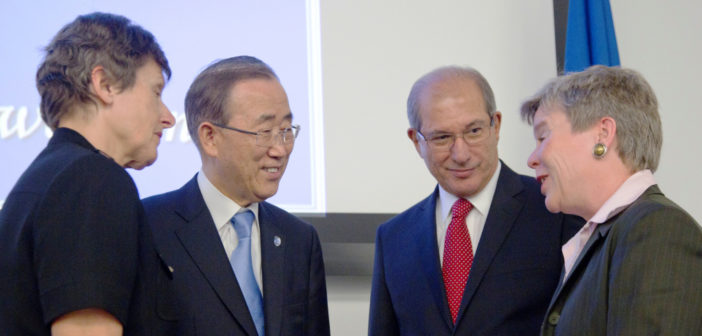
It has been exactly a year since I left my position of Director General of the Organisation for the Prohibition of Chemical Weapons (OPCW), at the end of my second term of four years. I was elected to this position ten years ago. I always felt accountable to the whole membership during my tenure and I acted impartially, while enjoying an independence guaranteed by the Chemical Weapons Convention (CWC). I strove to ensure that the Secretariat staff respected the same professional code of conduct.
I made clear on several occasions, however, that the Director General and the Secretariat could not remain indifferent when the credibility and integrity of the CWC regime were at stake. Our duty was to make every effort to protect it.
The organisation has faced such challenges since 2013. Chemicals weapons have been used in Syria, Iraq, Malaysia, and the United Kingdom. Investigations have confirmed this fact but no one is yet held accountable. This is profoundly regrettable.
The CWC is considered a highlight of the post-Cold War peace dividend. It established a total ban on an entire category of weapons of mass destruction. Its implementation was successful in that ninety-seven percent of the chemical weapon stocks declared by eight States were destroyed under the verification of the OPCW inspectors. All stocks will be eliminated by 2023. In recognition of its achievements, the OPCW was awarded the Nobel Peace Prize in 2013.
I thoroughly enjoyed the eight years I spent in this Organisation. The sense of purpose was overwhelming. Serving a noble cause for the well-being of humanity was a source of great satisfaction for me and my staff. I was proud of leading them; a group of outstanding experts made the OPCW a repository of knowledge and expertise in the field of chemical weapons. In spite of several attacks to undermine it, the OPCW proved its resilience. Its procedures and findings have always been science-based. I have learned over the years that science never lies.
There are now 193 States Parties to the CWC. Routine inspections are conducted in member countries to prevent any prohibited activity. The Convention is part of a series of international institutions and instruments shaping the international order established after the Second World War. It is essential for a rule-based system that guarantees universal peace and security.
Undermining the CWC regime, eroding the norm against the use of chemical weapons, will inevitably have wider implications for global peace and security. This must be prevented.
It is in this spirit that I set up the Fact Finding Mission in April 2014 to investigate allegations of use of chemical weapons in Syria. Its mandate was confined to reporting facts; to only say whether or not chemical weapons had been used. In order to identify the perpetrators of chemical attacks in Syria, a Joint Investigation Mechanism (JIM) was established by the UN Security Council in August 2015. It was partially successful because of deadlock at the Council over further action. The gap created by the failure to extend the mandate of the JIM has sought to be addressed by a mechanism established by the OPCW Conference of States Parties which convened in a special session in June 2018. An Investigation and Identification Team (IIT) will now endeavor to identify the perpetrators of several chemical weapons attacks in Syria.
The use of chemical weapons is a crime. The States Parties to the CWC have the obligation to enact laws to punish their nationals who commit such crimes. As to the violations by States, the provisions enshrined in the CWC can be invoked and the UN Security Council can be seized. It is absolutely fundamental that these atrocities do not remain unpunished. Surveys among criminals suggest that the certainty of punishment, rather than its severity, would do more to deter them.
I hope that the IIT will be successful and the criminals to be identified will be held to account by international or national courts. We cannot allow the hard-earned international norm against the use of the chemical weapons to be eroded and a culture of impunity to flourish.
It is the collective responsibility of the international community to ensure the respect for the ban on chemical weapons and to reinforce the credibility of the CWC regime. I believe that civil society can play a significant role in raising awareness among relevant stakeholders.
Ambassador Ahmet Üzümcü is a Senior Advisor at the Council on Strategic Risks. He was previously Director-General of the Organisation for the Prohibition of Chemical Weapons (OPCW) and a longtime diplomat. This article has been published originally at Councilonstrategicrisks.









